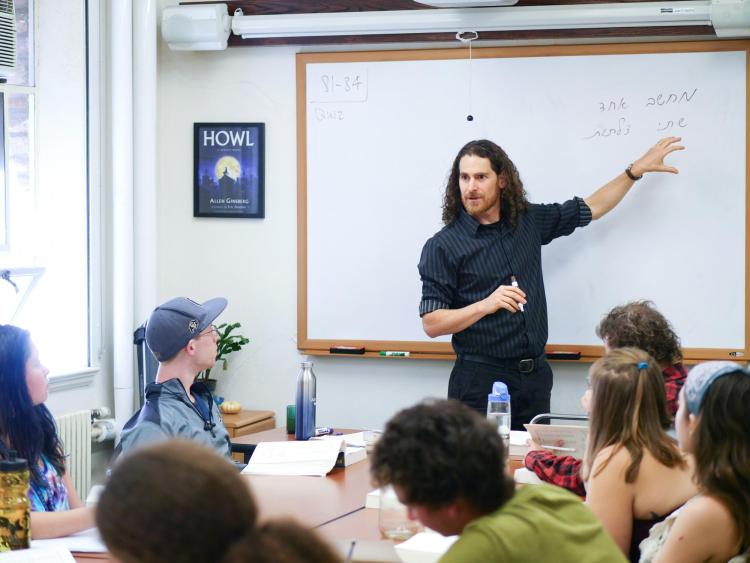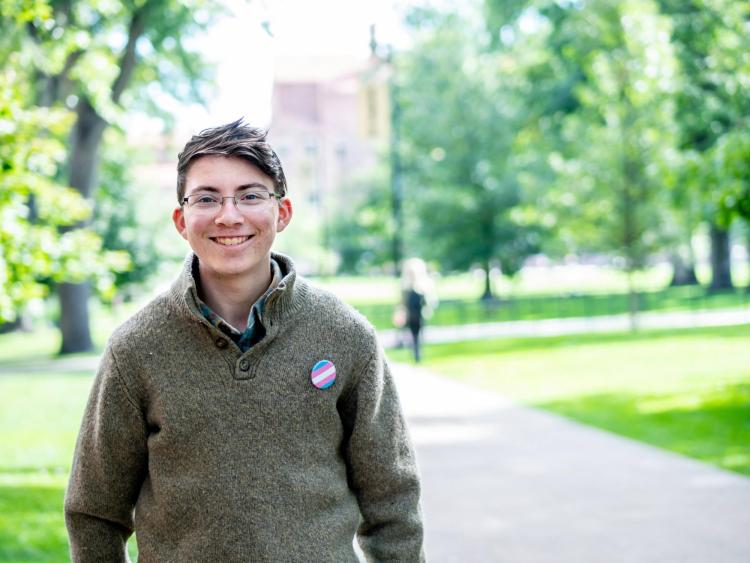Student constructs gender-inclusive Hebrew language rules
Some Hebrew students face a difficult task: describing themselves or what they are doing, partly due to the language’s strict gender rules. But thanks to a CU Boulder student and an instructor, a language with ancient roots could get some modern options.
Lior Gross identifies as gender nonbinary—neither male nor female.
In English, Gross uses they/them/their pronouns. But Hebrew can leave little to no room for those who identify as nonbinary. Many words in Hebrew require masculine or feminine gender-specific constructions.

Eyal Rivlin teaching class (Credit: CU Boulder)
Searching for a solution, Gross and Jewish Studies instructor Eyal Rivlin publicly launched their new gender-inclusive Hebrew language—the Nonbinary Hebrew Project—in late October.
The project dates back to last academic year. Gross, who graduates later this month, contacted Rivlin hoping to enroll in a Hebrew class. While Rivlin was happy to accommodate the request, he knew the language would present a special set of challenges for Gross.
Rivlin used the gender-neutral sentence “I am a good student” as an example. In Hebrew, speakers are forced to assign gender to both the words “good” and “student.”
“I actually think it was probably either really hard or maybe even impossible within Hebrew to identify as nonbinary,” said Rivlin.
Gross and Rivlin began researching alternatives in the spring and discovered incomplete solutions around the world.
Some nonbinary Hebrew speakers have taken to alternating between gender constructions while others simply stick with a gender that may not fully represent them. Other groups have created non-gendered language models that work for some words and phrases, but don’t follow consistent grammar rules.
“If you don’t have a word to conceptualize your experience, then you can’t connect to others and you feel really isolated about it,” said Gross. “When you don’t have the words to talk about an experience, it also changes the discourse in terms of who holds power and what conversations you get to have.”
A few basic rules
The Nonbinary Hebrew Project essentially creates a third gender category by adding the “-eh” suffix to most words. The novel construction can be used for nonbinary individuals as well as mixed-gender groups, which were previously referred to using the masculine plural.
“We ended up creating a few basic rules that apply to the whole language and actually make sense within the grammar system of Hebrew,” said Rivlin. “Native Hebrew speakers can intuitively, based on these few added rules, create this new language without any problems.”
Gross and Rivlin first started workshopping the language rules in a Hebrew class last spring. Since then, Rivlin has continued teaching the model with all his Hebrew Program students.
“My approach is to put this on the map and say, ‘Here’s another way that we can break out of the binary system,’” said Rivlin. “I feel like it’s useful both for Hebrew but also for educating students about diversity."

Lior Gross (Credit: Patrick Campbell/CU Boulder)
Overwhelming support
Since making the project public in October, Gross has received overwhelmingly positive feedback online from people who identify as nonbinary and others hoping to help spread the language.
Some have even shared the model at their own universities and congregations. Gross and Rivlin hope to see their language continue to grow at the grassroots level. They have already added infographics to the website and discussed developing instructional videos and a children’s song.
“The idea is that the website is in itself a standalone resource,” said Gross. “This isn’t really ours to own and solely be the teachers.”
Gross, who will graduate with concurrent bachelor’s and master’s degrees in ecology and evolutionary biology, already plans to become a rabbi. Gross sees the Nonbinary Hebrew Project as a natural continuation of Jewish teachings.
“One of the biggest things that resonates with me about Judaism is the encouragement of doubting and questioning and pushing back and holding multiple right answers,” said Gross.


